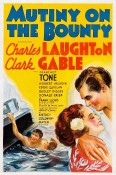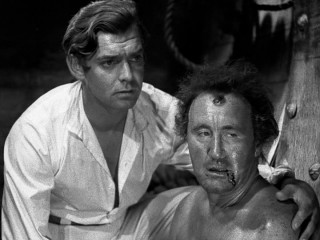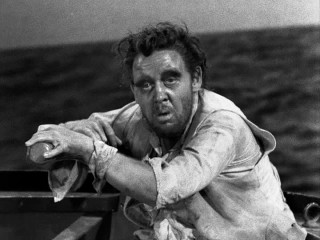| <- Previous 7. It Happened One Night |
8. Mutiny on the Bounty (1935) | Next -> 9. The Great Ziegfeld |
 |
Mutiny on the Bounty
Theatrical Release: November 8, 1935 / Running Time: 132 Minutes / Rating: Not Rated Director: Frank Lloyd / Writers: Talbot Jennings, Jules Furthman, Carey Wilson (screenplay); Charles Nordhoff, James Norman Hall (book) Cast: Charles Laughton (Captain William Bligh), Clark Gable (Fletcher Christian), Franchot Tone (Byam), Herbert Mundin (Smith), Eddie Quillan (Ellison), Dudley Digges (Bacchus), Donald Crisp (Burkitt), Henry Stephenson (Sir Joseph Banks), Francis Lister (Captain Nelson), Spring Byington (Mrs. Byam), Movita (Tehani), Mamo (Maimiti), Byron Russell (Quintal), Percy Waram (Coleman), David Torrence (Lord Hood), John Harrington (Mr. Purcell), Douglas Walton (Stewart), Ian Wolfe (Maggs), DeWitt Jennings (Fryer), Ivan Simpson (Morgan), Vernon Downing (Hayward), William Bambridge (Hitihiti), Marion Clayton (Mary Ellison), Stanley Fields (Muspratt), Wallis Clark (Morrison), Craufurd Kent (Lieutenant Edwards), Pat Flaherty (Churchill), Alec Craig (McCoy), Charles Irwin (Thompson), Dick Winslow (Tinkler) |
Clark Gable became the first actor to star in back-to-back Best Picture winners, when this seafaring drama (separated by seven Gable vehicles but no other Oscar ceremonies) Gable's signature mustache is shaved off here because facial hair was prohibited by the British Royal Navy in the 18th century. And that is about the extent of Mutiny on the Bounty's historical accuracy. In this dramatization of the storied 1789 mutiny, Gable plays Fletcher Christian, second in command to the tyrannical Captain William Bligh (Charles Laughton). Relentlessly tough on the sailors involuntarily enlisted on this breadfruit-collecting expedition, Bligh forces his men to forfeit their possessions and he subjects several to soul-crushing punishment. Captain Bligh crosses another line when he has the audacity to accuse Fletcher of stealing coconuts.
With seemingly no alternative, Christian reluctantly leads a revolt against Bligh's deadly reign, casting the captain and a small number of loyal men off to face the perilous ocean in a raft. Meanwhile, Christian and the mutineers make a return trip to Tahiti, the recently-visited tropical island whose comforts include a chief's daughter (Movita, today's only surviving cast member) with eyes for Fletcher. Against all odds, Bligh survives his fate. None the wiser for the wear, he insists on charging innocent men with high treason.
Although engaging enough, this historical drama feels dated and a bit simplistic in its depictions. Working from the first in Charles Nordhoff and James Norman Hall's trilogy of Bounty novels, the filmmakers decide that Bligh is sadistic and bad, while Christian is compassionate and good. The one-dimensional characterization spares viewers of having to choose a side with which to sympathize. It also turns an interesting occurrence into a standard old-fashioned adventure/drama film. Of course in 1935, the standard wasn't in place, making it understandable that the earliest viewers were more riveted than most of us will be today.
This wasn't the first time the story of the mutiny was put on film. Errol Flynn, cinema's best-known swashbuckler, made his screen debut playing Christian in the 1933 Australian movie In the Wake of the Bounty. Fascinatingly, there aren't just books and movies that recall the events of the mutiny. There are also the Pitcairn Islands, four small British territories located in the middle of the Pacific Ocean. They were where the mutineers (and new friends) went to from Tahiti. Not quite the paradise imagined, the formerly uninhabited islands treated its 25 new residents to murder, disease, and alcoholism. But not extinction; population grew to 233 around the time of this film's release but it has since shrunk to forty-eight. Among those forty-eight is Steven Raymond Christian, a seventh generation descendant of the real Fletcher Christian. Steven served as mayor of Pitcairn from 1999 to 2004, when he along with six other men (comprising about a quarter of the small country's male population) were put on trial for a slew of child rapes and sexual assaults.
While Warner treated the 1962 Mutiny to an expansive two-disc Special Edition, the 1935 film settles for just a handful of extras: trailers for both versions, an extremely short newsreel on the 1935 Oscar win, and a 10-minute 1935 short called Pitcairn Island Today which completely avoids discussing the supposedly long-accepted Polynesian tradition of underage sex.
Mutiny on the Bounty rating: 7 out of 10 - Buy from Amazon.com
Previous: It Happened One Night / Next: The Great Ziegfeld |
Related Reviews:
Treasure Island (1950) • 20,000 Leagues Under the Sea • The Curious Case of Benjamin Button
Johnny Tremain • Walt Disney Treasures: Elfego Baca • The Swamp Fox
Walt Disney Treasures: Dr. Syn - The Scarecrow of Romney Marsh • Lt. Robin Crusoe, U.S.N.
Best Picture Oscar Winners | UltimateDisney.com | DVD and Blu-ray Reviews | DVD & Blu-ray Schedule | Upcoming Cover Art | Search This Site
UltimateDisney.com/DVDizzy.com Top Stories:
Published April 18, 2010.
Text copyright 2010 DVDizzy.com. Images copyright 1935 Metro-Goldwyn-Mayer and 2004 Warner Home Video.



